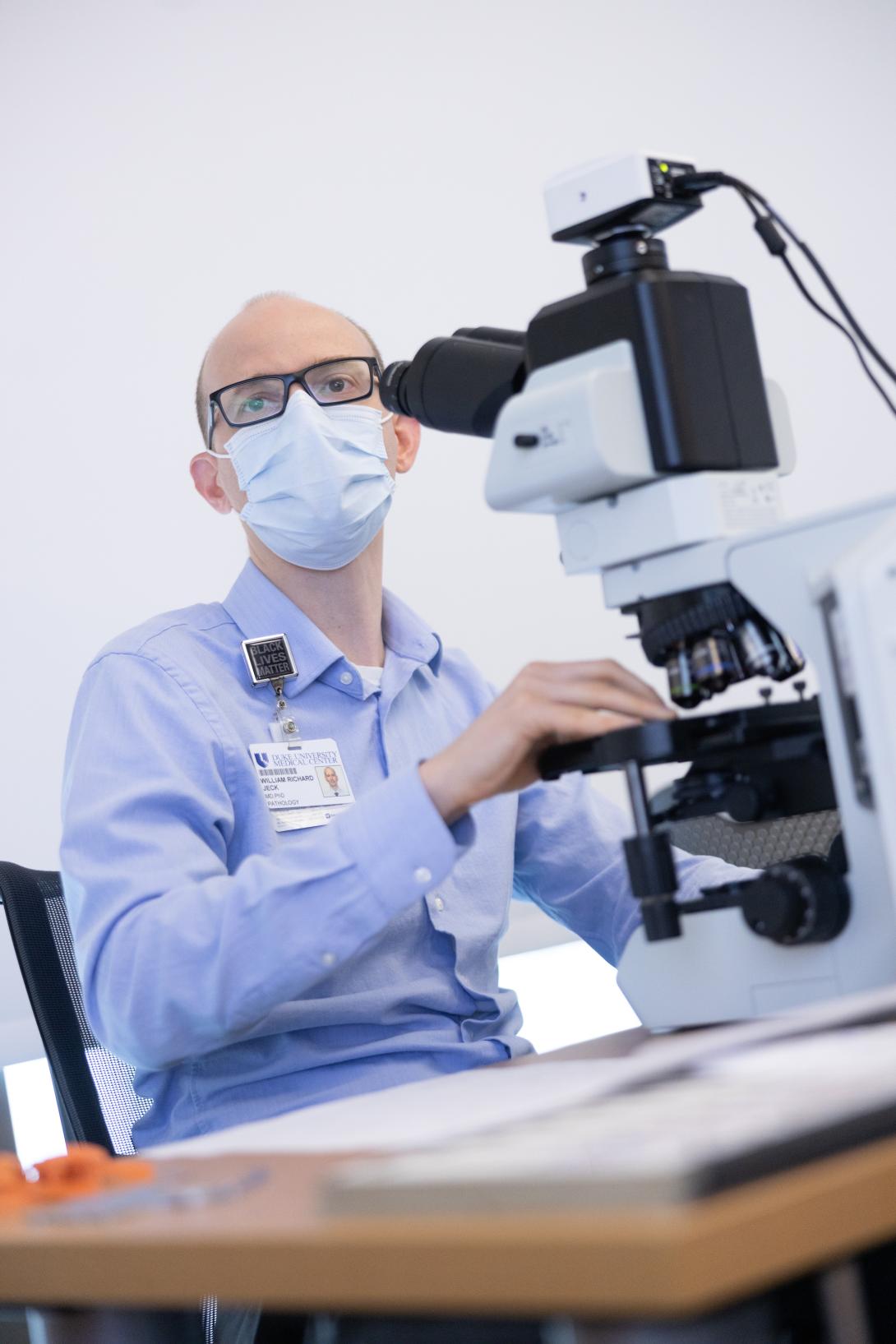A special report by Duke Cancer Institute the Department of Pathology, Duke University School of Medicine — as featured in the 2021-22 Department of Pathology Annual Report

Duke Expands Footprint in Next Gen Cancer Sequencing Tech
Updated

The Clinical Molecular Diagnostics Laboratory (MDL) is one of 60 work centers across three hospitals and multiple ambulatory locations that make up the Duke University Health System Clinical Laboratories, all of which are under the clinical, scientific, and administrative oversight of the Department of Pathology. The lab provides a wide range of DNA- and RNA-based molecular tests for inherited genetic diseases, cancers, and infectious diseases.
Roughly 80% of lab volume is oncology-related, according to Catherine Rehder, PhD, FACMG, who as director of Molecular Pathology, Genetics and Genomics in the Division of
Anatomical Pathology oversees both the MDL and the Clinical Cytogenetics Lab.
(Rehder's fellow Pathology Department faculty members Kristen Deak, PhD, FACMG, and Sarah Rapisardo, PhD, are associate directors, and Stefan Rentas, PhD, is assistant director.)
“With regard to cancer, our focus is on testing a set of genes that have already been discovered and have known clinical utility and significance, meaning they may be informative for the diagnosis, treatment, and management of various cancers,” explains Deak.
In solid tumor cancers, the MDL offers an in-house next-generation sequencing (NGS) panel that interrogates 50 of the most commonly mutated genes driving the growth and spread of solid tumor cancers. The most frequently tested samples come from individuals with lung cancer, colon cancer, and malignant melanoma.
This in-house test is a good place to start, but, if needed, Duke cancer patients with solid tumor cancers also have access to send-out testing by private molecular diagnostics companies that Duke contracts with. These tests analyze a few hundred of the most commonly altered genes across cancer types that may be receptive to molecularly targeted therapies as well as other biomarkers like tumor mutational burden (TMB) and microsatellite instability (MSI) that may be receptive to targeted therapies or even immunotherapies.
With both the in-house and the send-out tests, Duke Cancer Institute (DCI) clinicians are hoping that they’ll find something in the cancer cells that’s “druggable” with an existing targeted therapy or immunotherapy — whether FDA-approved, “emerging” with strong clinical evidence, being studied in clinical trials, or approved or being trialed in another indication/cancer type.
New Horizons
The Clinical Molecular Diagnostics Laboratory is currently poised to offer a larger, more comprehensive NGS profiling test to DCI patients with solid tumor cancers. This single tissue-based test, known as the pan-cancer “Elio” assay, covers single base changes, insertions, deletions, rearrangements, and amplifications in 500+ genes in solid tumor cancers, and, like the send-out vendors, can also detect high TMB and MSI. Like the lab's smaller test, this too will be conducted and analyzed in-house.
“One advantage to the Elio assay is that more genes are covered, but we also really like the idea of having control over our own data,” said Director of the BioRepository & Precision Pathology Center Shannon McCall, MD. “We will be generating the data from Elio in-house, and this data will feed smoothly into Epic as well as our Molecular Registry of Tumors database (Frameshift MRT) once we’ve built that interface internally.”
Medical Director of the DUHS Clinical Laboratories Michael Datto, MD, PhD, with McCall and Deak, partnered with Personal Genome Diagnostics (PGDx, a Labcorp subsidiary) for FDA clearance of the "Elio" test.
They supplied research samples from the BioRepository — 147 unique tissue specimens from more than 20 tumor types — that had already undergone diagnostic testing and these samples were then re-tested with the PGDx Elio assay.
The Elio assay performed well. Duke and PGDx investigators found a high degree of concordance between the new test results (using Elio) and previous test results (generated by the send-out testing partner). They published on this last year in the Journal of Molecular Diagnostics
“We wanted to be sure that the assay we chose would have similar performance to what the clinicians were getting from our current send-out partner before committing to an in-house solution for comprehensive genomic profiling in solid tumors,” notes Deak.
This is important, she explained, because “insurers require that laboratories demonstrate that every clinical test performed has proven clinical validity (diagnostic, prognostic, or theragnostic) before paying for the test.”
Deak said that the project team finalized the clinical validation — in the Clinical Molecular Diagnostics Laboratory — of the new, FDA-cleared panel in November and has created an interface with EPIC Beaker, which is currently being tested. (EPIC Beaker is the laboratory information system used by DUHS Clinical Labs.)
The Clinical Molecular Diagnostics Laboratory is also developing, for an early 2023 release, an in-house custom testing workflow to help clinicians determine whether sequencing variants detected in the patient’s tumor are germline (hereditary — in all cells of their body) or only present in their cancer cells. Traditionally this type of testing has been offered only by send-out vendors. This determination can change how a patient’s treatment is managed and, if hereditary, can be part of cancer risk assessment for other cancers in that patient and for cancer risk assessment in biological relatives.

Fusions: An Emerging Target
Also new from the Clinical Molecular Diagnostics Lab — an in-house RNA-based fusion panel to detect and identify fusions in 110 genes — diagnostic markers associated with sarcomas and other solid tumor malignancies.
Fusion genes — two previously separate genes rearranged to form a hybrid gene, which can lead to cancer — are found in some cases of sarcoma and are an emerging target for cancer treatment in this rare cancer type as well as in some other cancers.
This fusion panel is already operational. Deak headed up the development of the panel from the lab director's side. Barbara Anderson, an analytical specialist in the Clinical Molecular Diagnostics Laboratory, coordinated and ran the validation. William Jeck, MD, PhD, signing pathologist on the Sarcoma Service and Molecular Pathology Service, aided in the panel design (including which genes to include) and the test development plan with input from various pathologists.
In the Blood
The Clinical Molecular Diagnostics Laboratory — in partnership with the Clinical Cytogenetics, Flow Cytometry, and Immunohistochemistry laboratories — already has a robust NGS molecular testing mechanism in place to detect disease-specific diagnostic and prognostic molecular markers for lymphomas and leukemias. They offer an in-house Myeloid NGS test that’s used to detect the most frequently mutated regions of 75 target genes in myeloid disorders, including myeloid leukemias, as well as an in-house NGS Heme Fusion Panel that looks at RNA for identification of oncogenic fusions across 97 genes that drive blood cancers.
Deak says the lab team is currently working on a Lymphoid NGS Panel, which consists of the most frequently mutated regions of 71 gene targets involved in lymphoid malignancies, including chronic lymphocytic leukemia (CLL) and lymphoplasmacytic lymphoma (LPL).
“Many of the patients who would benefit from the Lymphoid NGS panel are currently being served by either the in-house Myeloid NGS panel or a send-out panel, both of which have considerable overlap with the panel we’re developing,” Deak explains, “but there’s also novel content on the lymphoid panel that’s not on the myeloid panel.”
Why this stepped-up expansion in testing?
“Our willingness to invest in the development of this testing (in the Pathology Department and in Duke Health Laboratories) for our cancer patients, is based on our strong belief in the future of precision medicine and our immediate desire to deliver test results to our patients sooner and sooner on their care path,” says Datto. “In-house testing allows our patient to get results faster, get on the right drug sooner, or get into a clinical trial in the hopes of a response or even a cure. In-house testing supports our research mission across Duke, and also allows us to train the next generation of molecular pathologists and clinical scientists. Maintaining a strong on-site clinical molecular lab with the ability to do amazing things is part of what makes us Duke!”




